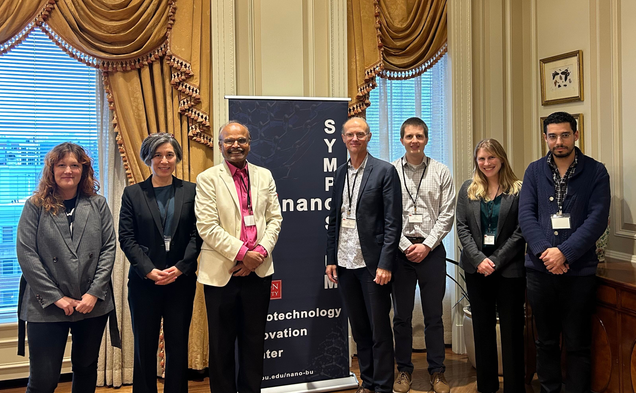2023 Annual Symposium Highlights
The 2023 BUnano Symposium, held on November 10, featured several exciting talks focused on topics interfacing nanotechnology and RNA with the keynote by Dr. Muthiah “Mano” Manoharan, Senior VP of Alnylam Pharmaceuticals. RNA based therapeutics are revolutionizing modern medicine as evident by this year’s Nobel Prize in Medicine to Dr. Drew Weissman, a Boston University (BU) alumni. To showcase BU’s research in this area, we selected three faculty who are advancing the science that harnesses the power of RNA.

The three BU faculty invited to present were, Dr. Florian Douam, Dr. Adriana Tomic, and Dr. Michelle Teplensky. Dr. Florian Duoam is Assistant Professor at the BU Chobanian and Avedisian School of Medicine. He currently leads the Douam Lab located at The National Emerging Infectious Diseases Laboratories (NEIDL), which focuses on identifying human immunological mechanisms that govern the pathogenicity and immunogenicity of positive-strand RNA viruses, including members of the Flaviviridae and Coronaviridae families. Dr. Michelle Teplensky is Assistant Professor of Biomedical Engineering and Materials Science and Engineering. Her laboratory’s research develops nanoscale architectures to reprogram and exploit immune cell processing by manipulating the architecture of biological moieties (DNA, peptides, proteins) through tools in nanochemistry. She is the 2023 honoree of American Institute of Chemical Engineers 35 Under 35: Bioengineering Category and the 2021 recipient of Northwestern University International Institute for Nanotechnology Outstanding Researcher Award. Dr. Adriana Tomic is Assistant Professor at BU’s Chobanian & Avedisian School of Medicine specializing in Virology, Immunology & Microbiology. Dr. Tomic is leading a Systems Immunology group at BU and is the co-founder of SIMON, an open-source knowledge discovery platform. Recognized by the American Association of Immunologists as the most-read publication, her contribution to SIMON has garnered her prestigious awards, including the Marie Curie Fellowship and Oxford Vaccine Group Award. At the interface between computational biology, infection biology and clinical research, her research aims to define the immunological signature of the protective immunity in humans.
Dr. Doum’s presentation, “Modeling human immune responses to viruses in small animal models,” discussed advancements in immunology, mouse genetics, and organoid development that enable the creation of improved humanized mouse models, offering valuable insights into how our immune system responds to viruses like arthropod-borne and respiratory viruses. The talk addressed that understanding how the human immune system responds to viral infections is challenging because other animals used in research don’t fully replicate human immune features. Humanized mice, which are mice with human cells or tissues, provide a powerful tool to study human immune responses to infections.
Dr. Teplensky, who has recently joined the Department of Biomedical Engineering and the BUnano Center, delivered her talk “Harnessing Nanoscale Engineering to Program Immunity.” She emphasized how vaccines have the potential to stimulate a targeted immune response against specific cancer-related mutations, but their effectiveness is often limited due to challenges in controlling the delivery and presentation of vaccine components to immune cells. This lack of nanoscale control hampers the immune response, and even when activated, the tumor’s immunosuppressive environment hinders the response’s durability. To address this, her group is exploring strategies to enhance vaccine efficacy by precisely arranging immunostimulatory, immune-targeting, and anti-immune evasion cues at the nanoscale, offering a promising approach to boost complex and robust immunity against various types of tumors and microenvironments.
Dr. Adriana Tomic, who has a joint appointment at both Department of Biomedical Engineering and the NEIDL, presented “Creating Smarter Vaccines: Understanding Our Immune System with Artificial Intelligence.” Her research aims to revolutionize healthcare by providing a comprehensive understanding of how the immune system interacts with pathogens. To overcome the challenge of translating large datasets into meaningful knowledge, her group has developed a unique strategy that combines high-level systems analysis with Artificial Intelligence. This approach has yielded detailed insights into the body’s defense mechanisms against diseases like influenza and SARS-CoV-2, allowing for the prediction of population-wide immune responses and the identification of protective factors, ultimately contributing to the development of rational vaccine designs.
The keynote speaker of the 2023 Annual symposium was Dr. Muthiah “Mano” Manoharan, Senior VP of Alnylam Pharmaceuticals. He was introduced by the Dean of the College of Engineering, Prof. Elise Morgan. Dr. Manoharan’s keynote focused on the strategies that have led to the development of five approved RNA therapeutics by Alnylam, demonstrating their effectiveness in treating diseases by manipulating gene expression Small interfering RNAs (siRNAs) block gene expression in a manner that resembles natural RNA interference. To deliver these therapeutic siRNAs to the human liver, Alnylam employed either lipid nanoparticle formulation or multivalent N-acetylgalactosamine conjugation, allowing for intravenous and subcutaneous administration.
The final talk was delivered by a promising young researcher, Joshua McGee, who is 3rd year BME PhD candidate in Dr. Wilson Wong’s Lab. He was one of the most decorated students to be admitted to the BU Department of Biomedical Engineering with NSF GRFP fellowship, NC State Future Leaders in Chemical Engineering Award, and UMass Rising Researcher Award. He is the co-author of three publications, as an undergraduate, focused on protein crystallography and CAR-T cells. Joshua’s doctoral research focuses on self-amplifying RNA.
The symposium also featured a poster presentation by the recipients of BUnano Crossdisciplinary Fellowship.
